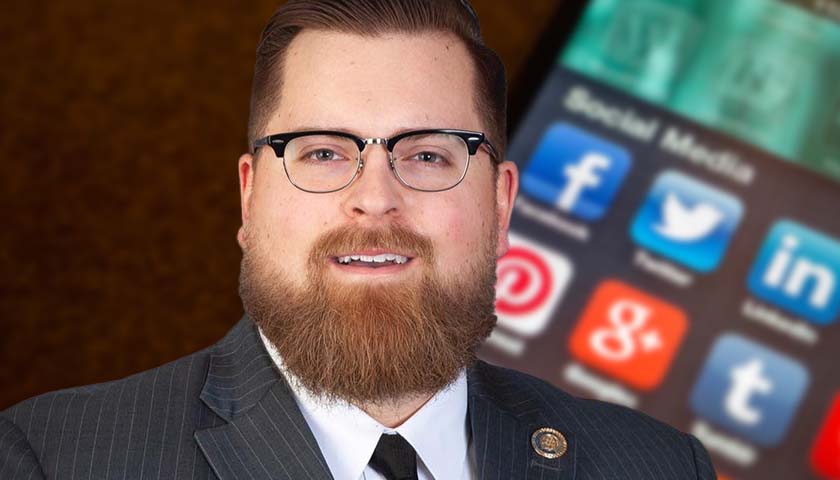Pennsylvania State Representative Mike Puskaric (R-Jefferson Hills) indicated Wednesday he will urge state agencies to ditch social media platforms he says engage in censorship.
In a memorandum asking fellow representatives to co-sponsor his upcoming resolution, the Pittsburgh-area legislator argued that especially large information technology companies violate the state and federal constitutions when they make politicized publishing decisions. He insisted government institutions and officials should respond by cancelling their accounts on such sites and signing onto more permissive online venues instead.
While constitutional speech protections have historically been applied solely to protect expression from government action, some Big Tech critics have begun to assert that certain companies illegitimately stifle free speech if they coordinate with public institutions or possess so massive a market share as to arguably become monopolies.
The representative could not be reached for comment and his co-sponsorship memo did not specify which platforms he would like commonwealth entities to quit nor which new networks he would encourage state actors to join. The statement declared, however, that the most heavily utilized sites are especially culpable when it comes to restricting certain voices or opinions.
According to the market data aggregator Statista, Facebook was the most popular social media site worldwide as of January 2022, with 2.91 billion users. It was followed by the video-sharing venue YouTube (2.56 billion users), the instant-messaging service WhatsApp (2 billion users), Facebook’s photo-sharing platform Instagram (1.48 billion users), and China-based WeChat and TikTok (both with about 1 billion users each).
“It is well known that the popular social media platforms censor the content that is placed on the platform,” Puskaric wrote. “This censorship is not only in clear violation of the freedom of speech that is granted to all U.S. citizens by the First Amendment to the U.S. Constitution, but also Article 1 of the Pennsylvania Constitution which protects the free communication of thoughts and opinions of every citizen. Despite these clear violations, Pennsylvania governmental agencies use official social media accounts to communicate with the public.”
In addition to Facebook and Instagram, the microblogging site Twitter (with roughly 200 million daily users) has garnered sharp scrutiny for blocking content that its corporate heads dislike. In October 2020, Twitter temporarily locked The New York Post’s account after the paper published an exposé about soon-to-be President Joe Biden’s son Hunter and the latter’s business dealings in Ukraine. The following January, Twitter permanently suspended outgoing President Donald Trump.
And throughout the COVID-19 pandemic, Twitter and other major electronic outlets have often removed content or engineered their internal algorithms to demote material that conflicted with governments’ prevailing position in favor of lockdowns and other restrictions. For instance, Twitter attached a warning to and forbade retweeting of a post by Harvard epidemiologist Martin Kulldorff questioning the need for universal vaccination.
As a senior researcher at the Massachusetts-based American Institute for Economic Research (AIER), Phillip W. Magness has observed much hostility by tech companies toward dissent on coronavirus policy. The think tank has championed the Great Barrington Declaration, a statement cowritten by Kulldorff and other well-reputed medical professionals that challenged the notion that the pandemic warranted long-term, onerous countermeasures. Soon after the document’s unveiling on October 5, 2020 at AIER’s campus, Magness says the search engine Google made a clear effort to encumber viewing of the declaration and to advance rebukes of it.
“It’s like they were putting their thumbs on the scale of what happened there,” Magness told The Pennsylvania Daily Star.
Last December, through a Freedom of Information Act request, AIER discovered emails between National Institutes of Health (NIH) director Francis Collins, National Institute of Allergy and Infectious Diseases Director Anthony Fauci and other public officials. Therein, Collins called Kulldorff and fellow Greater Barrington signatories Sunetra Gupta of Oxford and Jay Bhattacharya of Stanford “fringe epidemiologists.” The NIH chief called for a “quick and devastating published take down (sic)” of the declaration’s contentions.
What resulted, Magness said, was a “very aggressive and coordinated” campaign to discourage dissemination of the declaration and similar dissenting viewpoints pertaining to the pandemic.
Magness said, however, that while public officials should be penalized for enlisting media institutions to demote or bar content of which they disapprove, he nonetheless discourages legislative efforts to regulate any private institution’s policies on free expression.
“I’m generally of the opinion that, as private entities, they’re not subject to the same set of laws that would restrict government impositions on free speech,” he said. “But at the same time, what we have clearly playing out in several instances here are government officials that are putting pressure — direct pressure in many cases — on some of these social-media outlets to engage in censorship of free speech.”
Matthew Feeney, director of the D.C.-based Cato Institute’s Project on Emerging Technologies, agreed with Magness’s aversion to regulation of social media.
“The First Amendment protects citizens from censorship from the government,” he said. “It prevents the government from interfering in decisions that private actors make about speech, and that, I think, is oftentimes lost in this debate. When Facebook boots someone off the platform or Twitter closes an account, they may be doing something that people don’t like or it might be unpopular, but it’s got nothing to do with the First Amendment [except insofar as] that decision to remove content is protected from government interference by the First Amendment.”
– – –
Bradley Vasoli is managing editor of The Pennsylvania Daily Star. Follow Brad on Twitter at @BVasoli. Email tips to [email protected].
Photo “Mike Puskaric” by PA State Rep. Mike Puskaric. Attribution. Background Photo “Social Media Apps” by Jason Howie. CC BY 2.0.




